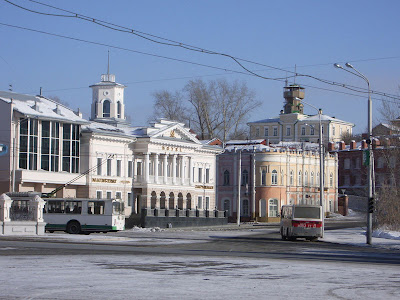State
prosecutors in the Siberian city of Tomsk are trying to ban the Russian translation
of the Bhagavad Gita, an important Hindu
scripture, because they believe the text too "extremist."
The
trial, which started in June, has attracted a lot of negative attention, and
sparked protests, which
even closed down the Indian
parliament Monday, according to the Guardian.
The
court's decision concerning the proposed ban was expected on Dec. 19, but
officials pushed back the date until Dec. 28.
Prosecutors
reportedly took issue with the Russian
translation of the sacred text called "Bhagavad Gita As It Is",
with commentary by A.C. Bhaktivedanta Swami Prabhupada, founder of the
International Society for Krishna Consciousness (ISKCON), because it promoted
"social discord" and hatred toward non believers, according to The
Hindu
Pre-1917 photograph of Trinity Cathedral, Tomsk (demolished 1934)
Pre-1917 photograph of Trinity Cathedral, Tomsk (demolished 1934)
However,
ISKCON followers and about 15,000 Indians living in Moscow say the proposed ban was brought about by a
"majority religious group's" intolerance toward the Hindu religion, the Asia Times reports.
Protesters
have even called on diplomats to intervene in the case.
But in
an exclusive interview with CNN-IBN,
Ambassador of Russia to India Alexander Kadakin explained the government cannot influence the courts. He
did, however, acknowledge the "madness" must come to an end. He said:
"...It is not the
Russian government that started the case; these are the some petty people in
far away though very beautiful city of Tomsk who did it. The government has
nothing to [apologize] for, the government can only testify and reiterate the
love and affection and highest esteem our nation has for Bhagavad Gita."
Tomsk State University
Last
year, courts banned Adolf Hitler's "Mein Kampf," but a spokesperson
for ISKCON India said comparing the Bhagavad Gita to the
dictator's autobiography was outrageous.
"To
compare Hitler to Lord Krishna is an insult to Indians across the globe," Vrajendra Nandandas told the Wall
Street Journal. "Our cultural
identity and ancient beliefs have been mocked at today."
If the
book is banned, ISKCON says the
government should expect
"intensified" protests, the Hindustan
Times reports.
Tomsk, 1898
Tomsk, 1898
NOTE: Although I usually try to read the mediocre-at-best Huffington Post as little as possible, this story about the events in Tomsk caught my eye.
So did this inconclusive and unsatisfying Shroud of Turin story.
So did this inconclusive and unsatisfying Shroud of Turin story.







Amazing!
ReplyDeleteI agree. Tomsk and the cartoon. The whole concept of Siberia captures the imagination. I was happy to be able to show summer and winter here. Curtis
ReplyDeleteCurtis
ReplyDeleteThe ISKCON protesters prevailed at the end. Though I haven't read Bhagwad Geeta I definitely.. 'plan' to do so.
And then moving further south as a Zen Buddhist would assert, 'Summer is winter too.'
Aditya: Thank you for the update. That's good to know. I love "Summer is winter too." Currently, I'm at a house we still own in the Hudson Valley north of New York City. It's not as cold as it might be for this time of year, but two of our heating zones are out and it could be a lot warmer. Thoughts of moving south are very "current" with us, but I expect we'll wait a couple of years until our daughter finishes high school. I really can't stand the cold weather any more and I love warm weather. That being said, I love the summer/winter contrast photos here and have grown mildly interested in Tomsk. Have a very happy 2012. Curtis
ReplyDelete